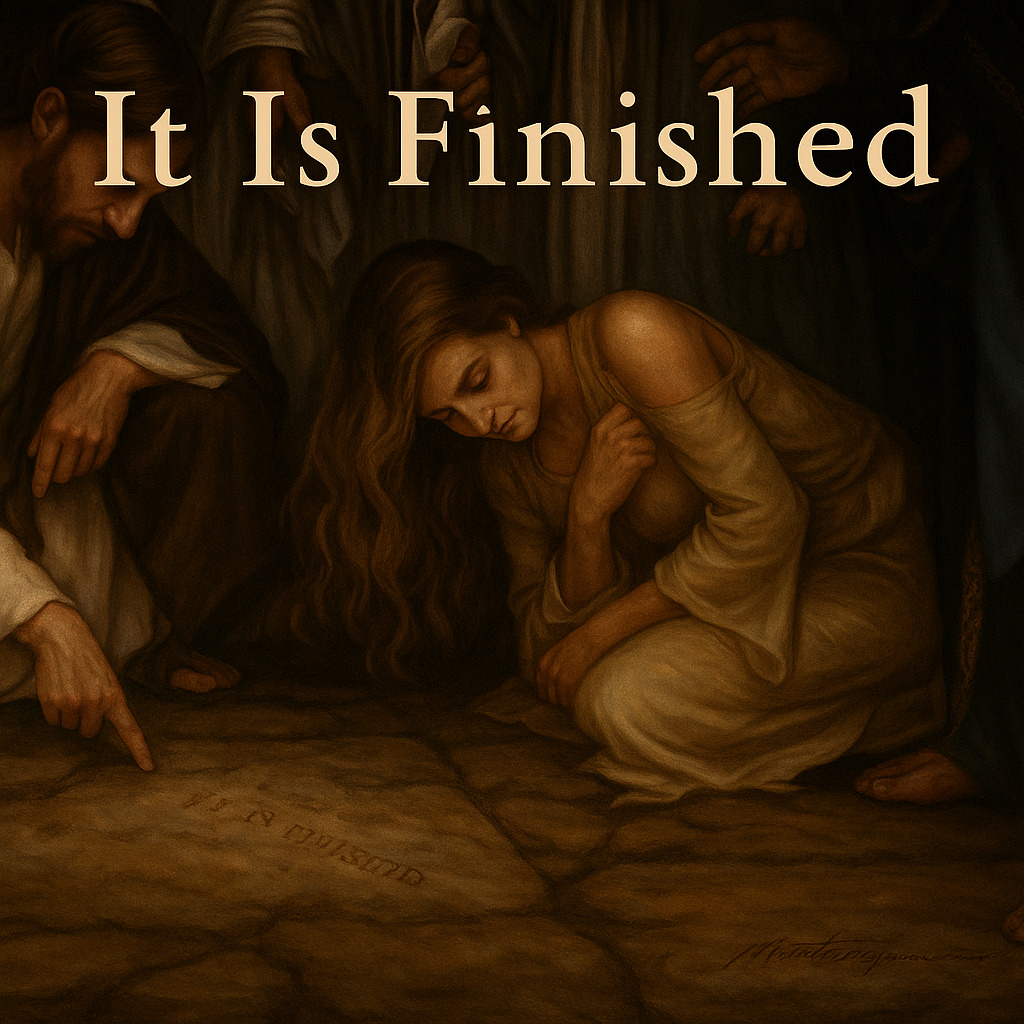
It Is Finished — So Why Do We Still Feel Ashamed?
It Is Finished — So Why Do We Still Feel Ashamed?
🎧 Listen to the Devotional
Press play to hear the full devotional, “It Is Finished — So Why Do We Still Feel Ashamed?”
The Story
The crowd dragged her through the dust, fists clenched around stones, eyes blazing with accusation.
A woman—caught in the sexual sin of adultery. A sin punishable by death.
She stood trembling in the open square, her failure made public, her shame on display. Every whisper, every glare, every heartbeat told her the same thing: shame on you — you are guilty.
The teachers of the Law confronted Jesus.
“Teacher, this woman was caught in the very act. Moses commanded us to stone such a woman. What do You say?”
It was a trap. They cared little for her sin, and even less for her soul. But Jesus didn’t answer. He stooped down and began to write in the dust with His finger—the same finger that had once written the Law on tablets of stone.
And as He wrote, the air thickened with silence. When He finally spoke, His words cut through centuries of guilt: “Let the one who is without sin cast the first stone.”
Jesus Himself was the only one there without sin—and yet He never reached for a stone. Instead, He reached for her dignity.
One by one, the stones fell from trembling hands as the religious turned away, until only the Creator of the universe—clothed in grace—remained.
Then Jesus stood, His shadow covering her shame. “Woman, where are they? Has no one condemned you?” She whispered, “No one, Lord.” And He said, “Neither do I condemn you. Go now, and leave your life of sin.”
The Word
“Therefore, there is now no condemnation for those who are in Christ Jesus.”
— Romans 8:1
“For I resolved to know nothing while I was with you except Jesus Christ and Him crucified.”
— 1 Corinthians 2:2
This is the scandal of the Gospel — that God doesn’t wait for repentance before He saves. He brings salvation first, and repentance follows as the natural, Spirit-led response to grace.
The woman didn’t repent before she was forgiven. She was forgiven — and then she was free to turn. Love opened her eyes before obedience ever moved her feet.
We often forget what Jesus really meant when enduring the cross, despising the shame—shame that He carried for us. And then, through blood and agony, He loudly proclaimed, “It is finished!” He wasn’t announcing defeat; He was declaring victory — the end of sin’s reign, the breaking of guilt’s chains, the death of condemnation.
He has put shame to death. Yet too often, we listen to the accuser and pick it back up again.
Grace, however, keeps whispering: “Look up.” Salvation has already been given. The work is already done. God doesn’t demand repentance — He reveals His love, and repentance becomes the awakened heart’s response. When grace opens your eyes to the One standing before you — in your sin, in your weakness, yet full of love — you turn toward Him. That turning isn’t duty. It’s delight. It’s not fear. It’s freedom.
Like the woman that day, we find ourselves caught and exposed — and then lifted by hands that bear scars. He gently raises our chin, and we dare to meet His gaze. In His eyes, there is no trace of accusation. Only compassion. Only love. Only the reflection of the one He came to redeem.
He has already taken care of every sin and every shame. The verdict is done. The cross has spoken. Now, go — live in the shadow of that cross. Free to live. Alive to praise.
The Call
Stop hiding from the One who came to save you. Listen for His voice above the noise of accusation. When He says, “Neither do I condemn you,” believe Him.
Walk today as one who has seen the scandalous grace of God — and live amazed by the cross.
The Prayer
Jesus,
Open my eyes to see what You’ve already done.
Remind me that salvation isn’t something I earn — it’s something You’ve finished.
Thank You that grace comes first, and repentance follows like a heartbeat awakened by love.
Silence the accuser’s voice when shame tries to return.
Lift my head to see Your eyes of mercy.
Let me live every day unafraid, unashamed, and fully alive in the freedom You’ve already given.
Amen.
Quick Additional Thought: What Is Shame?
Shame is the voice that tells you your failure is your identity. It’s the whisper that says, “You’re not just someone who sinned — you are the sin.”
Guilt says, “I did something wrong.”
Shame says, “I am something wrong.”
And that’s the lie Jesus came to destroy. On the cross, He didn’t just carry our guilt — He carried our shame. He endured the humiliation, the nakedness, the rejection — all the things that make us hide — and He despised that shame. Why? Because it had no right to define us.
When He said, “It is finished,” He wasn’t just ending sin’s power; He was ending shame’s story. So now, in Christ, your past doesn’t name you. Your failure doesn’t brand you.
You are no longer “the one caught” — you are the one set free.
Another Thought: What Does It Mean That Jesus Bore Our Shame?
Shame was the very first result of sin. When Adam and Eve disobeyed, their eyes were opened — and they felt exposed. Their first reaction wasn’t rebellion; it was to hide.
They covered themselves and hid from the presence of God, believing their failure had changed how He saw them. But it hadn’t changed Him at all. He came looking for them. “Where are you?” He asked — not because He didn’t know, but because He refused to let shame have the final word.
That’s what Jesus came to do — to bear our shame and end the separation it causes. On the cross, He stepped into our hiding place. He endured the mocking, the nakedness, the rejection — everything shame used to convince us that God could never want us again. He bore it all so we would never have to hide again.
To bear our shame means Jesus carried not just our sin, but the distance it created. He stepped into the isolation and humiliation that shame produces. He took it all upon Himself — and in doing so, He broke its power forever.
When He endured the cross and despised the shame, He wasn’t ignoring it — He was defeating it. He faced what we fear most: being fully seen and still unloved. But instead of turning away, He loved us through it.
He stood exposed so we could stand unashamed. He faced rejection so we could walk in acceptance.
When He cried out, “It is finished,” shame’s story was over. Now, when we’re tempted to hide, He still calls softly, “Where are you?” Not to accuse — but to restore.
He bore our shame so that nothing — not even our own fear — could ever separate us from His love again.
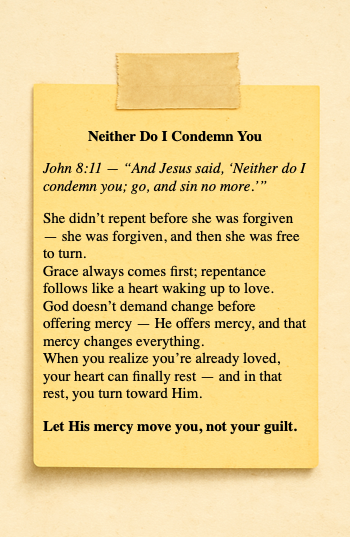
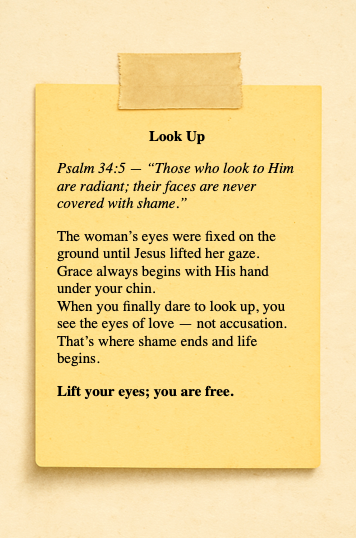
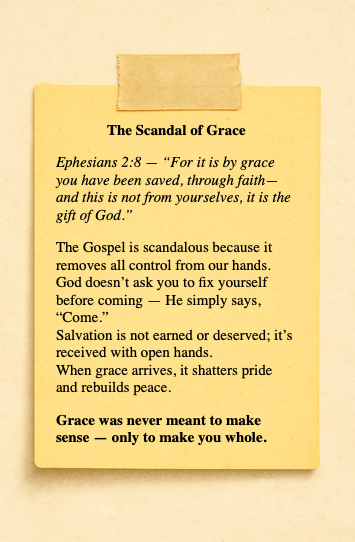
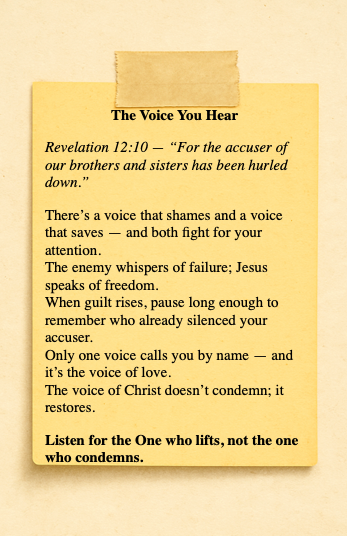
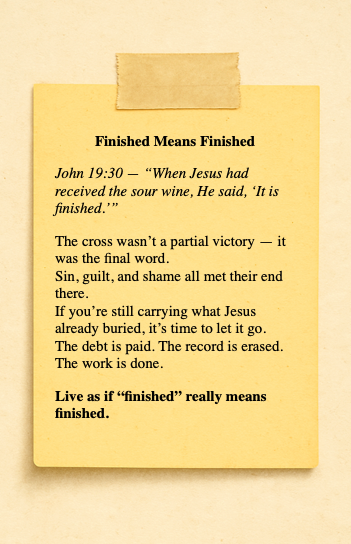
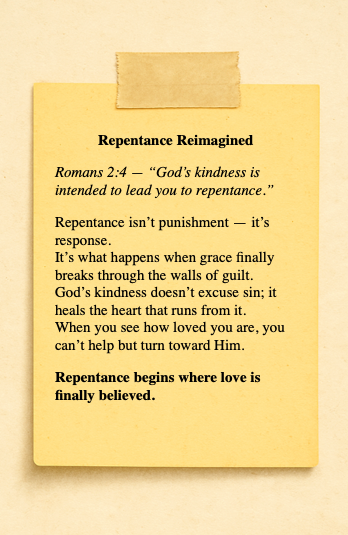


Love that: Grace first then repentance.
That’s exactly the point that inspired this week’s blog.